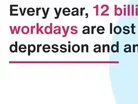Business leaders launch workplace mental health alliance

A group of global organisations and business leaders have come together to form a first-of-its-kind coalition committed to advancing mental health awareness and best practices in the workplace.
Recognising the importance and priority of mental health awareness and action in light of the pandemic, whose social and economic effects are having a growing impact on employee mental health, leaders from some of the world’s biggest businesses have joined forces to drive change in business and society by tackling workplace mental health.
The Global Businesss Collaboration for Better Workplace Mental Health is made up of founding members including HSBC Group Chief Executive Noel Quinn, Deloitte Global CEO Punit Renjen, Unilever CEO
Alan Jope, Salesforce CEO Marc Benioff, Clifford Chance Managing Partner Matthew Layton and and BHP CEO Mike Henry.
With a vision of a world where all workplace leaders recognise and commit to taking tangible and evidence-based action on mental health and wellbeing in the workplace, this business-led initiative has been designed to both raise awareness and facilitate the adoption of best practices.
With the world rebuilding after the COVID-19 pandemic, the founding CEOs urge the business community to “prioritise and invest in the mental health of all employees” and they invite other leaders of businesses, both big and small, from all over the world to “join this global movement to advance the desperately-needed conversation around creating an open, welcoming,a nd supportive workplace environment for all”.
Businesses will need to commit to various actions
To become a member, business leaders must sign a pledge and commit to a number of actions within their business. These include:
- Develop and deliver an action plan to foster good mental health in the respective organisation;
- Promote an open culture around mental health that aims to eliminate stigma;
- Take proactive steps to develop the culture and ways of working towards creating positive mental health and reducing mental ill-health;
- Empower all employees to manage and prioritise their mental health and support one another;
- Inform employees of available mental health tools and support they need;
- Regularly measure the impact of the efforts, being open about our progress, to influence and inspire change in the organisation and beyond.
Mental health a big problem for workplace leaders
Considering that work, including working conditions, is one of the key social determinants of mental health, according to the WHO, businesses have a key role to play in ensuring the mental health safety of their employees, and especially right now.
While the mental health crisis was of concern even before the onset of COVID-19, the social and economic damage inflicted by the pandemic has exacerbated the mental health crisis.
According to The World’s Economic Forum's Head of Shaping the Future of Health Healthcare, Arnaud Bernaert, Head of Shaping the Future of Health and Healthcare, more than half of working adults report increases in anxiety and decreases in productivity at work in response to COVID-19 and as such, coordinated action and public-private partnerships are “key to galvising action among employers globally to promote wellbeing of their workforces now and in the future”.
Punit Renjen, Global CEO of Deloitte states: “The pandemic has cast a spotlight on the need to address mental health in the workplace. As business leaders, we have a responsibility to break down the stigma associated with mental health issues like stress and anxiety to ensure everyone can thrive at work."
- Leadership development remains critical to successLeadership & Strategy
- Five Minutes With: Björn Dufwenberg, MD at Strat7 AdvisoryLeadership & Strategy
- Building bridges between management and productivityLeadership & Strategy
- How analogous inspiration can solve your strategic deadlockLeadership & Strategy
Featured Articles
SAP has announced it has appointed a new President for a newly-created EMEA region, aiming to make the most of the opportunities of cloud and AI technology
Technology giant SAP has expanded its portfolio with the acquisition of LeanIX, a leader in enterprise architecture management (EAM) software
To help businesses achieve increased productivity, Siemens and Microsoft are deepening their partnership by showcasing the benefits of generative AI



